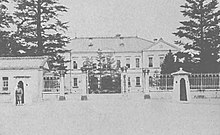3rd Division (Imperial Japanese Army)
| 3rd Division | |
|---|---|
 Headquarter of the 3rd Division in 1911, Nagoya | |
| Active | 1888–1945 |
| Country | |
| Branch | Imperial Japanese Army |
| Type | Infantry |
| Garrison/HQ | Nagoya, Aichi, Japan |
| Engagements | First Sino-Japanese War Russo-Japanese War Siberian Intervention Shandong Incident World War II |
| Commanders | |
| Notable commanders | Taro Katsura Yoshimichi Hasegawa Yusaku Uehara Nobuyoshi Muto |
The 3rd Division (第三師団, Dai-san shidan) was an infantry division in the Imperial Japanese Army. Its call sign was the Happiness Division (幸兵団, Sachi-heidan).
History
The 3rd Division was formed in Nagoya in January 1871 as the Nagoya Garrison (名古屋鎮台, Nagoya chindai), one of six regional commands created in the fledgling Imperial Japanese Army. The Nagoya Garrison had responsibility for the central region of Japan. This region was known as the Chūbu district, and stretched from Aichi Prefecture to Ishikawa Prefecture. Upon the recommendations of the Prussian military advisor Jakob Meckel to the Japanese government, the six regional commands were transformed into divisions under the army reorganization of 14 May 1888.
As one of the oldest divisions in the Imperial Japanese Army, the 3rd Division participated in combat operations during the First Sino-Japanese War, the Russo-Japanese War, the Siberian Intervention, and the Shandong Incident.
Some of its more noteworthy commanders included Katsura Taro, Hasegawa Yoshimichi, Uehara Yusaku and Nobuyoshi Muto.
9 December 1938, the 3rd Division was subordinated to 11th Army and was subsequently one of the divisions assigned to the China Expeditionary Army (CGA) headquartered in Nanjing. As one of the most powerful units ("crack" units) in the theatre, the 3rd Division served in nearly every battle in central China. During the Zhejiang-Jiangxi Campaign it was converted into a triangular division on July 4, 1942. It later served for a time as a headquarters and garrison division for strategic Zhejiang Province.
Battles and Campaigns fought in China (1937–1945)
- Battle of West Henan-North Hubei (possibly messed up with 3rd Tank Division)
At the end of World War II, with the dissolution of the Imperial Japanese Army, the 3rd Division was formally disbanded in Zhejiang.
